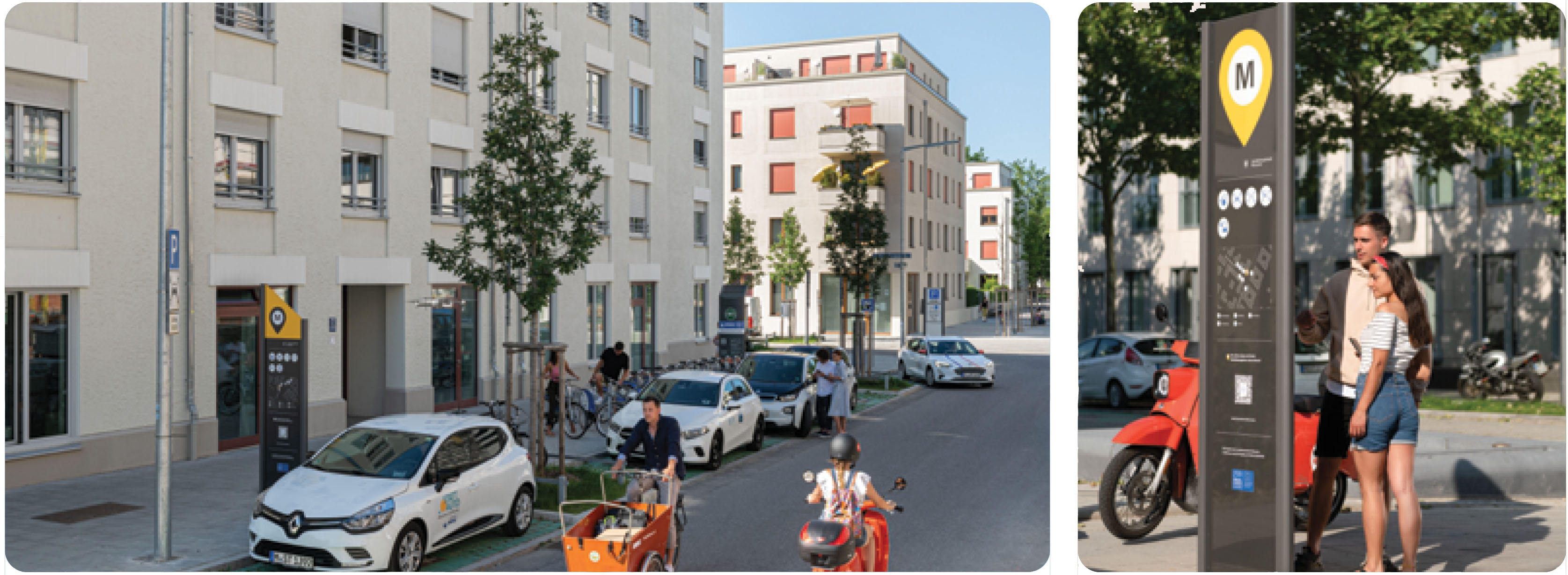As part of the EU-funded CIVITAS ECCENTRIC project, Munich has set up four mobility stations. The multimodal mobility offers are a real alternative to car ownership and can help to reduce emissions.
Financed by the EU's Horizon 2020 programme, CIVITAS ECCENTRIC is a four-year project that develops smart mobility. Within CIVITAS ECCENTRIC, the cities of Turku, Madrid, Munich, Ruse and Stockholm are working together to overcome challenges related to mobility in suburban districts and achieving transport and city logistics that is clean, silent and CO2 emission-free.
Background
The northern area of Munich is growing twice as fast as the overall city leading to an increasing number of road and mobility users, an overburdened traffic network and high emissions. Several former barrack sites are currently under conversion into new housing areas in order to accommodate the tremendous increase in population. This new area, called Domagkpark and Parkstadt Schwabing is consequently supposed to be pilot area of the project CIVITAS ECCENTRIC to promote sustainable mobility. Currently there are only little alternatives to individual car use existing.
Correlating to this growth of population and traffic, the project area aims to build less than (the obligatory) 1.0 parking lots per household in Munich as well as to prove the functionality of this approach through the integration of attractive alternatives for more sustainable mobility modes.
In order to achieve easily accessible and user-friendly services for mobility as a real alternative to individual car ownership, the development and implementation of mobility stations is part of this approach.

How mobility stations work
Mobility stations combine and provide different types of mobility services and ensure that suitable means of transport are available at any time in order to reduce private car ownership of residents and customers. The innovative aspect is to combine several sharing mobility technologies (car-sharing (stationary, free floating, electric), (e-) scooters, cargo- and normal bikes) in connection and complementation with the use of public transport. The provision of multimodal mobility service alows residents to live a private-car-free-lifestyle or at least have significant lower mobility costs and reduce emissions. Mobility stations feature a new design and are a new means of providing access to these services in Munich. They are combined with new regulations that enable reserving parking space only for carsharing vehicles. The stations are provided by the City of Munich on public space offering a platform for all interested private mobility suppliers.
Evaluation and Results
An evaluation of mobility stations in the project area, using a two-wave household survey (05/2018 and 10/2019), shows that residents who are making use of the mobility offers are very satisfied with the mobility stations and the selection of vehicles as well as the services which are being provided. Statistics showed that most users of the mobility station use at fist place carsharing followed by bikesharing and e-scooter-sharing options. Evaluation results indicate that there was an increase of the system usage when a marketing campaign for the mobility stations started. Regarding the emissions of NO2, CO2 and PM, statistics showed that the implementation of mobility stations led to a strong decrease of all three factors of emissions for users of mobility stations. Also, it can be seen that users of mobility stations have significant lower emissions regarding NO2, CO2 and PM compared to non-users of mobility stations living in the area.
But there is still a high percentage of people who know the vehicles and services of a mobility station but do not use them. In general, the usage rate of mobility stations is low and a significant positive mode shift towards more sustainable transport options could not be evaluated within the short project lifetime. Residents obviously need more time to change their mobility behavior. To raise the awareness of the mobility stations and make them more visible, residents wish to have a more striking color marking of the station and to integrate the service into Munich's mobility apps.
Outlook
The City of Munich plans a city-wide implementation oft the concept of mobility stations. The mobility stations are easy to upscale because there are already four mobility stations which have been implemented in Munich's CIVITAS ECCENTRIC Living Lab as well as investment and operational costs can be numbered quiet precisely. Further promoting and upscaling of mobility stations could have a long term impact regarding lowering emissions and promote a mode shift. Residents might become more familiar with the sharing concept and use the shared vehicles more often.